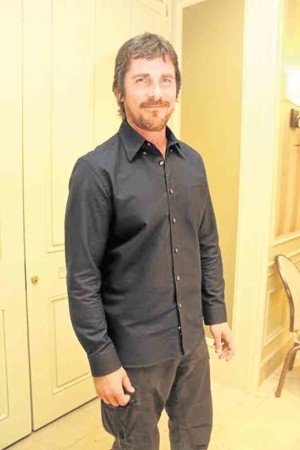LOS ANGELES—We’ve experienced interviewing Christian Bale when he was in a serious, brooding mood. We’ve also seen Christian when he was in an upbeat spirit. He has different moods like us, mere mortals.
In our recent encounter, the actor who played Batman three times was at his most jovial and charming self. He was beaming throughout our chat at the Four Seasons Hotel in LA, often laughing. Wearing a black shirt and cargo pants, the bearded Wales-born actor fiddled with the cap of his water bottle as he parried questions.
The 2011 Oscar and Golden Globe best supporting actor winner for “The Fighter” chuckled when he admitted who decides what film projects he takes. “My wife is a large part of that—if she gives the nod of approval or not to it,” he said about Sibi, his wife since 2000. They have a daughter and a son.
“I am a little bit random [about my choices], really,” he added. “There are a number of things I have regretted just because of situations or moods I had been in at the time. I didn’t recognize how good something was, and I had not pursued it.
Since his new film is titled “The Promise,” Christian was asked if he was the type of man who kept his promises. “Yeah, promises get you into a lot of trouble (laughs), don’t they?” he answered, his eyes full of mirth. “Once you have made promises, you can’t take them back. But yeah, I feel like I am [good at keeping promises].”
A historical drama set in Turkey at the outset of World War I, “The Promise” features a love triangle involving Chris (Christian), an AP reporter; his fiancée, Ana (Charlotte Le Bon); and Mikael (Oscar Isaac), a medical student.
Asked if he was the jealous type, Christian laughed again as he replied, “I don’t want to tell you about my own jealousies.
“My character, Chris, knows he’s lost the second he sees Mikael. That is how I felt anyway. But Chris has sincere love for Ana, so the jealousy comes from his incredible pride. He’s a very opinionated, arrogant man of appetites, with an acerbic nature. I’d say he has a superiority complex.
“But he’s a man who seeks truth and sees there’s a connection there (between Ana and Mikael) that he can’t even begin to compete with, that there’s an obligation that she has toward him. There’s a possibility for something absolutely truthful between them that is impossible with Ana and Chris.”
According to producers Eric Esrailian and Mike Medavoy, the love triangle was introduced because they didn’t want the film to come across as a history lesson.
The film, directed by Terry George, tackles the Armenian genocide which Wikipedia describes as “the Ottoman government’s systematic extermination of 1.5 million Armenians, mostly Ottoman citizens within the Ottoman Empire and its successor state, the Republic of Turkey. The starting date is conventionally held to be April 24, 1915, the day that Ottoman authorities rounded up, arrested and deported 235 to 270 Armenian intellectuals and community leaders from Constantinople to the region of Ankara, the majority of whom were eventually murdered.
“The genocide was carried out during and after World War I and implemented in two phases: the wholesale killing of the able-bodied male population through massacre and subjection of army conscripts to forced labor, followed by the deportation of women, children, the elderly and the infirm on death marches leading to the Syrian desert. Driven forward by military escorts, the deportees were deprived of food and water and subjected to periodic robbery, rape and massacre.
“Other indigenous and Christian ethnic groups such as the Assyrians and the Ottoman Greeks were similarly targeted for extermination by the Ottoman government in the Assyrian genocide and the Greek genocide, and their treatment is considered by some historians to be part of the same genocidal policy.”
According to The Daily Californian, “It is estimated that between 800,000 and 1.5 million Armenians died in this approximately seven-year period. To this day, the Turkish government denies that any genocide occurred.”
Christian turned serious when he discussed the film’s subject. “To my shame, I knew nothing about the Armenian genocide when I first got the script,” he said. “I don’t know if I just wasn’t a very good [history] student, or I wasn’t listening.”
The late film mogul, Kirk Kerkorian, and Eric, created Survival Pictures, dedicated to bringing to the screen stories with social relevance. Proceeds from the film, which was made for $100 million, will be donated to nonprofit organizations.
“I haven’t experienced this before,” Christian pointed out. “It was very inspiring—the altruism, with which this film was made and as the motivation for it. The efforts to actually make this are something larger than just a film, that this can hopefully help enlighten people about not just the Armenian genocide, but all forms of genocide, as well. And the relevance—it was the first one in modern history.”
On the parallels between this story’s early 20th century period when his reporter character runs into obstacles as he seeks the truth and today’s situation under the Trump administration and its “alternative facts” pronouncements, Christian said, “Fake news. We are dealing with a national platform of what we’re talking about now, with the a la carte approach to truth on the internet (the Trump administration and its ‘alternative facts’).
“We are talking about an individual (Trump) who just refuses to acknowledge the truth. I still don’t have an answer on how you deal with that, except to just walk away. It’s infuriating but, hopefully, you turn it into amusement.”
Christian will next play Dick Cheney in an untitled biopic of the former US vice president. He will voice Bagheera in Andy Serkis’ “Jungle Book.”
E-mail rvnepales_5585@yahoo.com. Follow him at https://twitter.com/nepalesruben.
